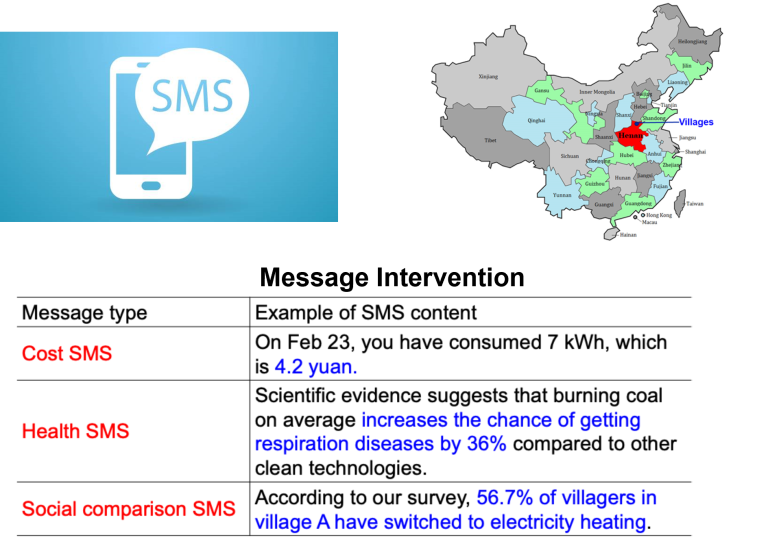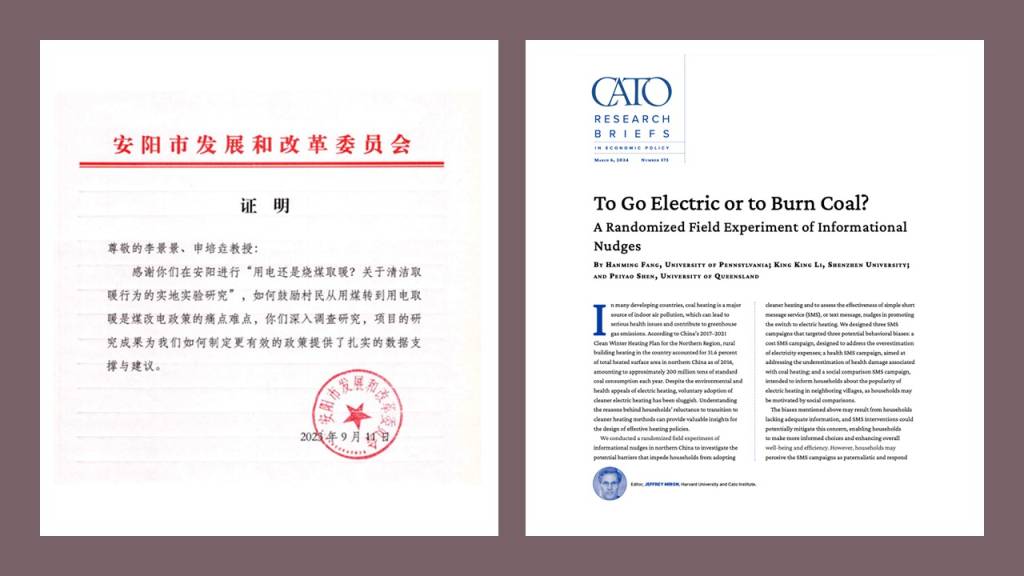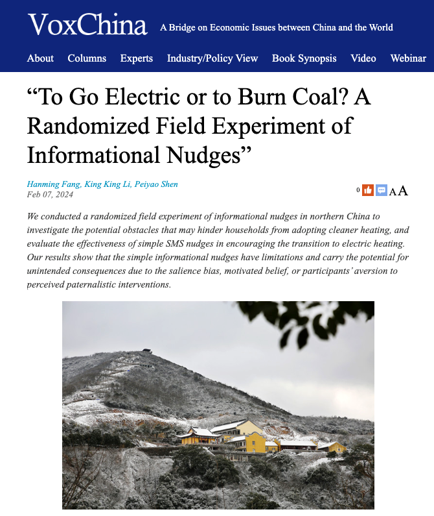Research Funding Supported by National Natural Science Foundation of China (NSFC Grant No. 71973099)
Project Team:
- Prof. Hanming FANG, Joseph M. Cohen Term Professor of Economics, University of Pennsylvania
- Dr. King King LI, Associate Professor, The Hang Seng University of Hong Kong
- Dr. Peiyao SHEN, Postgraduate Research Fellow, The University of Queensland
The Social Problem: Low Adoption of Cleaner Electric Heating
In many developing countries, coal heating is a major source of indoor air pollution, which can lead to serious health issues and contribute to greenhouse gas emissions. In China, more than one-third of the households continue to rely on coal burning stoves for heat. According to China's 2017–2021 Clean Winter Heating Plan for the Northern Region, coal heating accounted for 31.6 percent of total heating in northern China as of 2016, amounting to approximately 200 million tons of coal consumption each year. Despite the environmental and health appeals of electric heating, voluntary adoption of cleaner electric heating has been sluggish. Understanding the reasons behind households' reluctance to transition to cleaner heating methods can provide valuable insights for the design of effective heating policies.
What have we done? A Randomized Field Experiment of Informational Nudges
We conducted a randomized field experiment of informational nudges in northern China to investigate the potential barriers that impede households from adopting cleaner heating and to assess the effectiveness of simple SMS nudges in promoting the switch to electric heating.
Our study consisted of two stages. First, we conducted a survey with households that have both coal heating stoves and electric heating devices at home. The survey enabled us to gather information about households' heating preferences, as well as factors that drive these preferences, and to elicit their estimates of the cost of electric heating and the health damage associated with coal heating.
Second, we designed three SMS campaigns that targeted three potential behavioral biases: a cost SMS campaign, designed to address the overestimation of electricity expenses; a health SMS campaign, aimed at addressing the underestimation of health damage associated with coal heating; and a social comparison SMS campaign, intended to inform households about the popularity of electric heating in neighboring villages, as households may be motivated by social comparisons.

The Key Findings
A large proportion of households substantially overestimate their electricity expenses. Most households underestimate the health damage of coal heating.
Effect of Interventions:
The cost SMS did not impact households that overestimated cost, but it decreased electric heating usage by 76.8 percent for households that prioritized cost considerations.
Health SMS did not impact households that underestimate the health damage of coal heating. However, it increased electric heating usage by 52.5 percent for households that already correctly understood the health damage of coal heating and by 35.7 percent for households that considered health as an important factor in their heating choices. Moreover, the health SMS reduced electric heating usage by 54.5 percent for households that indicated a lack of concern regarding health consequences.
The social comparison SMS increased electric heating by 148.3 percent, but only among households that reported being concerned about their neighbors' heating choices.
Key Takeaways: Insights for Solutions for the Social Problem
Information nudges may appear to be a cost-effective way to promote electric heating, but our field experiment reveals their limitations and the potential for unintended consequences. Designing effective nudge interventions requires considering the differing beliefs and motivations of households. Interventions should target specific groups that are most likely to be receptive while avoiding groups that may resist or counteract the interventions.
The Impacts
Helping Chinese Government to Design the Heating Policy
The research findings have received attention from the Development and Reform Commission (DRC) of An Yang City of the People's Republic of China. It has helped the government in designing a more effective heating policy.
Knowledge Dissemination with the General Public
The research has attracted attention from The Cato Institute, an influential think tank based in the USA. The institute has published a summary of our research findings in the Cato Research Briefs in Economic Policy (No. 373).
The research has also been reported by VoxChina, an independent, non-partisan and non-profit platform initiated by a group of experienced and accomplished economists that reports research-based policy analysis on Chinese economic issues.
Publications
- Hanming Fang, King King Li, and Peiyao Shen (2025). To Go Electric or To Burn Coal? A Randomized Field Experiment of Informational Nudges, Journal of Environmental Economics and Management, Volume 132, 103155, ISSN 0095-0696,
https://doi.org/10.1016/j.jeem.2025.103155. - Hanming Fang, King King Li, and Peiyao Shen, To Go Electric or to Burn Coal? A Randomized Field Experiment of Informational Nudges, National Bureau of Economic Research Working Paper no. 31841, November 2023 https://www.nber.org/papers/w31841




